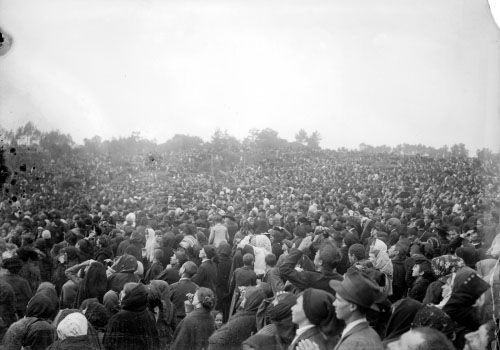- Joined
- Dec 8, 2011
- Messages
- 3,074
- Reaction score
- 840
- Gender
- Male
- Political Leaning
- Moderate
There's no evidence that false made up belief systems were ever propagated and copied on anything like the scale we see for the NT,
There are actually a ton of examples. UFO claims, Islam, Mormonism, bigfoot, etc with a ton of records and witnesses.
as you said most claims about the supernatural are false, so surely if this too were false we'd expect to see many examples of writings like the NT, penned very early on, copied without error? Why - if what you say is true - do we not find a multitude of texts like the NT? there are none, absolutely none, it is unique on a variety of measures.
There was no logical reason for anyone to believe Christ was anything special at all, he had nothing to offer, no food, no military prospect of resisting Roman occupation, he was openly irreverent to Jewish authorities, what he said was often incomprehensible to people (and is still to this day), there really was nothing "religious" about him in the sense we today understand the term.
And we have many writing from any different religions at the time. But there is a good explanation for the number of records for Christianity.
1. It came from a highly advanced Roman Empire with a lot of literacy. This era as a golden age and previous ages didn't have the records and literacy the Roman Era had. Christianity was also a later religion and there was less time for records to be lost. If Christianity had started in Aboriginese Australia, or in ancient Sumer, it wouldn't have had the number of records.
2. Jesus taught a very inspirational message of love and kindness. His philosophy was ahead of its time and no other religion had anything like it. This made Christianity crazy popular among the common people. Imagine hearing or reading Christ's message in that brutal harsh era with brutal Gods. It would give you chills down your back and bring you to tears.
3. Christianity focused obsessively on missionary work in a way other religion's didn't. You didn't have Roman polytheists going out and trying to convert everyone with missionaries like the Christians did.
4. Christians later took over the Roman Empire. The Catholic Church put a lot of work to properly maintaining Christian records but not for other religions. Other religions may have had some great records, but were lost.
I think it is absolutely valid to demand physical evidence for supernatural claims, I've never argued otherwise. In fact my position here has been that if these things really did happen then what else could we expect as evidence two thousand years later?
Evidence that would help more would be less biased sources verifying the supernatural claims. And these claims being verified by multiple unconnected people who would have no motivation to lie and were eyewitnesses. For example if numerous non-Christian sources actually did say the dead rose from their graves about the time Jesus died. The evidence needs to be substantial because its plausible the Christians played a trick of some kind like having a look-alike of Jesus walking around. As long as a hoax is possible, I can't say its probably supernatural.
All we could hope for is what we have: a written record, we'd hope that that record stood out in some way, could give us reason to regard as not just another set of writings, and that's what we find, the speed at which it was written and meticulously copied with very few transcription errors or deliberate alterations all serve to make the NT stand out from any other ancient text.
The question one must ask is if we do examine all this in detail, the text, the history etc is it reasonable to conclude it is true? these things did happen? that the text has been preserved because of huge desire to record the events very early on, a huge desire to ensure as best one could to get this story out precisely because it was known, certain by those who were there at the outset.
This is why I've asked people what they would do, few here have cleared the mind and imagined they were in that situation, witnessing absolutely astonishing events, hearing incomprehensible yet deeply philosophical words, what would you do, what could you do?
That's why this thread is so titled - its asking people to really, really, really think.
I wouldn't believe in UFO claims or Mormonism simply because people wrote books claiming incredible things happened. Even if I had no explanation for the NT at all, extraordinary claims require extraordinary evidence. Being very popular doesn't verify supernatural claims, being in a book soon after doesn't verify supernatural claims, and having multiple religious leaders back each other up doesn't verify supernatural claims.

